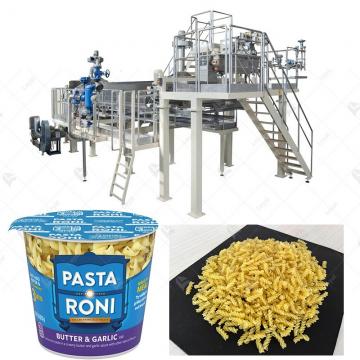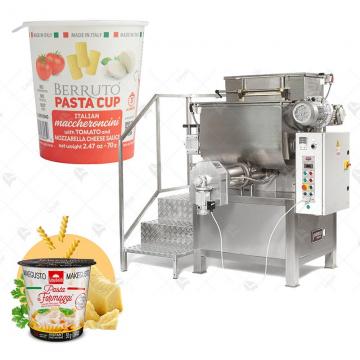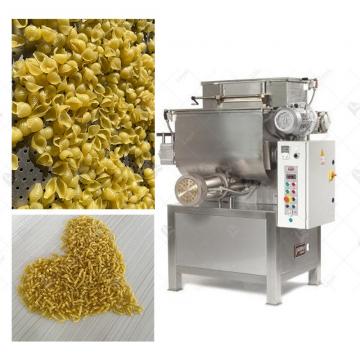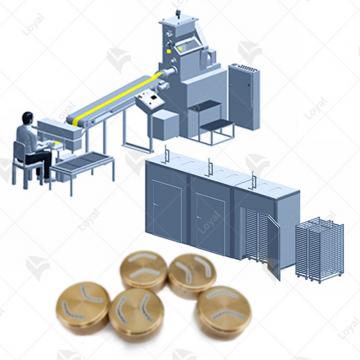
- Shandong Loyal Industrial Co.,Ltd.
- SHORT-CUT PASTA PRODUCTION LINE LONG-CUT PASTA PRODUCTION LINE INSTANT PASTA PRODUCTION LINE
Home> Company News> The Ultimate Guide to Pasta Processing Equipment in 2024

The Ultimate Guide to Pasta Processing Equipment in 2024
2024-03-28 13:59:16The importance of pasta processing equipment in the food industry cannot be overstated. These advanced machines play a crucial role in meeting the growing demand for pasta products while maintaining high standards of quality and efficiency. By automating and optimizing the pasta production process, processing equipment helps manufacturers streamline operations, reduce costs, and deliver consistent results to consumers worldwide.
One of the key advantages of pasta processing equipment is its ability to handle large-scale production volumes without compromising on quality. With the capacity to produce a wide range of pasta varieties at high speeds, these machines empower manufacturers to meet market demand efficiently. Additionally, the precise control offered by modern pasta processing equipment ensures uniformity in product texture, shape, and flavor, enhancing consumer satisfaction and brand reputation.
Moreover, pasta processing equipment contributes to food safety and hygiene by implementing stringent quality control measures throughout the production process. From ingredient handling and mixing to shaping, cutting, and packaging, these machines are designed to minimize the risk of contamination and ensure compliance with regulatory standards.
In today's competitive food industry landscape, investing in state-of-the-art pasta processing equipment is essential for staying competitive and meeting consumer expectations. By embracing technological advancements and adopting efficient production practices, manufacturers can unlock new opportunities for growth, innovation, and success in the dynamic world of pasta production.
Introduction to Different Types of Pasta Processing Equipment
In the ever-evolving world of culinary technology, automatic pasta making machines have revolutionized the way pasta is produced. These sophisticated pieces of equipment streamline the pasta-making process, allowing for increased efficiency and consistency in production. In this guide, we will explore the various types of pasta processing equipment available in 2024 and their respective features and benefits.
Automatic Pasta Making Machine:The automatic pasta making machine is the cornerstone of modern pasta production facilities. Utilizing advanced technology, these machines are capable of mixing, kneading, extruding, and cutting pasta dough into various shapes and sizes with minimal human intervention. With customizable settings and precise control mechanisms, operators can adjust parameters such as dough consistency, extrusion speed, and cutting dimensions to produce pasta of consistent quality.
Pasta Processing Equipment:In addition to automatic pasta making machines, there is a wide range of auxiliary equipment designed to complement the pasta production process. These include dough mixers, pasta extruders, drying racks, and packaging machines. Each piece of equipment plays a crucial role in different stages of pasta production, from preparing the dough to packaging the final product.
Electric Pasta Machine:The electric pasta machine is a versatile tool commonly used in smaller-scale pasta production or home kitchens. These compact machines feature electric motors that automate the rolling and cutting of pasta dough, eliminating the need for manual cranking. While not as efficient as industrial-grade automatic pasta making machines, electric pasta machines offer convenience and ease of use for hobbyists and small-scale producers.
Application of Pasta Processing Equipment
Restaurant and Catering Services:Pasta processing equipment is indispensable in restaurant kitchens and catering services where large volumes of pasta dishes are prepared daily. With the help of automatic pasta making machines and electric pasta machines, chefs can streamline their workflow, ensuring prompt service without compromising on quality. These machines enable chefs to experiment with different pasta shapes, flavors, and textures, offering customers a diverse and satisfying dining experience.
Food Manufacturing and Distribution:Food manufacturing companies rely on pasta processing equipment to produce a wide range of pasta products for retail and wholesale distribution. Whether it's dried pasta for supermarkets, fresh pasta for specialty stores, or frozen pasta meals for convenience stores, efficient pasta processing equipment is essential for meeting the demands of a global market. By investing in advanced machinery, manufacturers can increase their production capacity, improve product consistency, and expand their product offerings to cater to diverse consumer preferences.
Culinary Education and Training:Pasta processing equipment plays a crucial role in culinary education and training programs, where aspiring chefs learn the art of pasta making. These programs often feature hands-on workshops and demonstrations using commercial-grade pasta processing equipment, allowing students to familiarize themselves with industry-standard practices and techniques. By mastering the operation of these machines, students gain valuable skills that prepare them for careers in professional kitchens and food production facilities.
Home Cooking and Meal Preparation:Electric pasta machines have become increasingly popular among home cooks seeking to replicate the authentic pasta-making experience in their own kitchens. These user-friendly machines enable enthusiasts to create fresh, homemade pasta with ease, allowing for customization according to personal taste preferences. From classic spaghetti and fettuccine to creative shapes like bowties and shells, electric pasta machines empower home cooks to unleash their culinary creativity and impress family and friends with delicious homemade pasta dishes.
Specialty Food Businesses:Specialty food businesses, such as artisanal pasta shops and gourmet food stores, rely on pasta processing equipment to differentiate their products in a competitive market. By investing in high-quality machinery and using premium ingredients, these businesses can produce artisanal pasta with superior taste and texture, appealing to discerning customers willing to pay a premium for quality. Pasta processing equipment enables specialty food businesses to maintain the artisanal craftsmanship and authenticity that sets their products apart from mass-produced alternatives.
Benefits of Pasta Processing Equipment
1. Quality Assurance: Pasta processing equipment ensures consistent quality by precisely controlling factors such as dough hydration, mixing times, and extrusion pressure. This consistency translates to uniform texture, taste, and cooking properties in the final product, enhancing consumer satisfaction and brand reputation.
2. Versatility: Modern pasta processing equipment is highly versatile, capable of producing a wide variety of pasta shapes, sizes, and textures. Whether it's long strands of spaghetti, delicate angel hair pasta, or intricate shapes like fusilli or penne, these machines can accommodate diverse culinary preferences and market demands.
3. Cost Savings: While the initial investment in pasta processing equipment may be significant, the long-term cost savings are substantial. Automated machines reduce the need for manual labor, minimizing labor costs and potential human errors. Additionally, efficient production processes result in lower energy consumption and raw material wastage, further contributing to cost savings over time.
4. Time Efficiency: Time is of the essence in the food industry, and pasta processing equipment significantly reduces production lead times. Automated machines can mix, knead, extrude, and cut pasta dough at a much faster rate than traditional methods, allowing manufacturers to meet tight deadlines and respond quickly to market demands.
5. Hygiene and Sanitation: With strict food safety regulations in place, maintaining hygiene and sanitation standards is paramount in food processing facilities. Pasta processing equipment is designed with hygiene in mind, featuring easy-to-clean surfaces, removable components, and advanced sanitation systems that minimize the risk of contamination and ensure product safety.
6. Customization: Pasta processing equipment offers customizable options to tailor pasta products according to specific dietary preferences or market trends. Whether it's incorporating alternative flours, adding natural colors and flavors, or adjusting ingredient proportions, manufacturers can easily adapt their production processes to meet evolving consumer demands.
7. Sustainability: Sustainable practices are increasingly important in the food industry, and pasta processing equipment can contribute to environmental conservation efforts. By optimizing resource utilization, minimizing waste generation, and adopting eco-friendly technologies, manufacturers can reduce their carbon footprint and promote sustainable production practices.
Types of Pasta Processing Equipment
1. Automatic Pasta Making Machine: The cornerstone of modern pasta production, these machines handle the entire pasta-making process from mixing and kneading the dough to shaping and cutting the pasta. With advanced features such as programmable settings and real-time monitoring, they ensure optimal results with minimal manual intervention.
2. Pasta Extruders: These specialized machines are designed to extrude pasta dough throughse consumer preferences.
3. Drying Tunnels: After shaping, pasta needs to be dried to the desired moisture content to ensure shelf stability. Drying tunnels provide a controlled environment with consistent temperature and humidity levels, facilitating uniform drying and preventing product spoilage.
4. Cutting Machines: Once dried, pasta sheets or strands need to be cut into specific lengths or shapes. Cutting machines come in various configurations, including rotary cutters, guillotine cutters, and laser cutters, offering precision and efficiency in pasta cutting operations.
5. Packaging Equipment: Efficient packaging is essential to preserve the quality and freshness of pasta products. Packaging equipment such as form-fill-seal machines and vacuum sealers ensure proper sealing and packaging of pasta products, extending their shelf life and enhancing product presentation.
6. Quality Control Systems: Maintaining consistent quality is critical in pasta production. Advanced quality control systems, including sensors, cameras, and software algorithms, monitor various parameters such as texture, color, and size, ensuring that only high-quality pasta products reach the market.
7. Mixing and Kneading Machines: The foundation of any pasta recipe lies in the proper mixing and kneading of dough ingredients. Mixing and kneading machines automate this process, ensuring thorough blending of ingredients and optimal dough consistency for subsequent processing steps.
8. Sheeting Machines: In pasta production, dough is often rolled into thin sheets before shaping. Sheeting machines roll out dough to precise thickness levels, providing a uniform base for shaping into various pasta types such as lasagna sheets or ravioli wrappers.
9. Cooking Equipment: Industrial-scale pasta production often involves cooking pasta prior to drying or packaging. Cooking equipment, including steamers and boiling tanks, ensure efficient and consistent cooking of pasta products, maintaining their texture and taste.
10. Cleaning and Sanitization Systems: Hygiene and cleanliness are essential in food processing facilities. Cleaning and sanitization systems, including automated washers and sanitizing tunnels, ensure the hygiene of pasta processing equipment, preventing contamination and ensuring food safety.
Factors to Consider When Choosing Pasta Processing Equipment
When it comes to selecting pasta processing equipment for your business, there are several crucial factors to consider. Investing in the right machinery can significantly impact your production efficiency, product quality, and overall profitability.
Production Capacity:Automatic pasta making machines come in various sizes and capacities. It's essential to assess your production needs and select equipment that can meet your output requirements. Consider factors such as the volume of pasta you intend to produce daily and the potential for future growth. Opt for a machine with a production capacity that aligns with your business goals.
Versatility:Pasta processing equipment that offers versatility can provide added value to your business. Look for machines that can produce a wide range of pasta shapes and sizes, allowing you to cater to diverse customer preferences. Versatile equipment enables you to adapt to changing market demands and expand your product offerings without the need for additional machinery.
Cost-effectiveness:While upfront costs are important, it's essential to consider the long-term cost-effectiveness of the equipment. Evaluate factors such as energy efficiency, maintenance requirements, and durability. Investing in high-quality electric pasta machines may require a larger initial investment but can result in lower operating costs and higher returns on investment over time.
Space Requirements:Consider the available space in your production facility when choosing pasta processing equipment. Opt for machines that are compact and can be easily integrated into your existing layout. Modular designs or equipment with a small footprint can help maximize your floor space and streamline workflow efficiency.
Compatibility:Ensure that the pasta processing equipment you choose is compatible with your existing production lines and processes. Seamless integration can minimize downtime and operational disruptions during installation and setup. Consider factors such as interface compatibility, automation capabilities, and ease of synchronization with other equipment.
Latest Technological Advancements in Pasta Processing Equipment
In 2024, the automatic pasta making machine has emerged as a game-changer in the pasta manufacturing industry. This cutting-edge pasta processing equipment integrates advanced technologies to streamline the production process and enhance overall efficiency. With its ability to automate various stages of pasta production, such as mixing, kneading, and extrusion, the automatic pasta making machine has revolutionized the way pasta is manufactured.
One of the key features of the electric pasta machine is its precision and consistency in producing high-quality pasta products. By utilizing state-of-the-art sensors and control systems, this equipment ensures uniformity in texture, shape, and size, resulting in superior pasta products that meet the highest standards of taste and appearance. Manufacturers can now rely on the electric pasta machine to consistently deliver excellent results, reducing wastage and increasing profitability.
Moreover, the automatic pasta making machine is equipped with advanced safety features to protect operators and maintain a hygienic production environment. With automated cleaning and sanitation systems, the equipment minimizes the risk of contamination and ensures compliance with stringent food safety regulations. As a result, manufacturers can operate with peace of mind, knowing that their products are produced under optimal conditions.
Case studies from leading pasta manufacturers demonstrate the significant benefits of adopting advanced equipment in pasta manufacturing. By investing in the latest pasta processing equipment, companies have experienced dramatic improvements in productivity, cost savings, and product quality. With faster production cycles and reduced downtime, manufacturers can meet growing demand while maintaining competitive pricing in the market.
In conclusion, the latest technological advancements in pasta processing equipment have transformed the industry, enabling manufacturers to achieve unprecedented levels of efficiency and quality. With innovations such as the automatic pasta making machine, pasta manufacturers can stay ahead of the curve and meet the evolving demands of consumers worldwide. As technology continues to evolve, we can expect further enhancements in pasta processing equipment, driving the industry towards even greater heights of success.
Maintenance and Troubleshooting Tips for Pasta Processing Equipment
Pasta processing equipment plays a crucial role in the efficiency and quality of pasta production. To ensure smooth operations and minimize downtime, it's essential to implement regular maintenance and troubleshoot issues promptly. Here are some maintenance and troubleshooting tips for pasta processing equipment:
Maintenance Tips
1. Regular Cleaning: Proper cleaning is paramount for maintaining hygiene and preventing the buildup of residues that can affect equipment performance. Clean the equipment daily using mild detergents and sanitizers recommended by the manufacturer.
2. Lubrication: Keep moving parts well-lubricated to prevent friction and wear. Check the manufacturer's guidelines for the type and frequency of lubrication required for each component, including conveyor belts, rollers, and gears.
3. Inspection of Wear Parts: Regularly inspect wear parts such as blades, dies, and molds for signs of wear and tear. Replace them as needed to ensure consistent product quality and prevent breakdowns.
4. Tightening Loose Connections: Periodically check and tighten any loose bolts, nuts, or connections to maintain equipment stability and prevent accidents.
5. Calibration: Calibrate measuring instruments and sensors regularly to ensure accurate measurements and optimal performance. Follow the manufacturer's instructions for calibration procedures.
Troubleshooting Tips
1. Machine Jamming: If the pasta processing equipment frequently jams, check for obstructions in the feeding mechanism or conveyor belts. Clear any blockages and ensure proper alignment of components.
2. Uneven Product Texture: If the pasta products have uneven texture or shape, inspect the dies and molds for damage or misalignment. Adjust or replace them as necessary to achieve uniform product quality.
3. Excessive Noise or Vibration: Unusual noise or vibration may indicate worn-out bearings or misaligned components. Inspect and replace damaged bearings, and realign components to reduce noise and vibration levels.
4. Inconsistent Temperature Control: If the equipment fails to maintain consistent temperature levels, check the heating elements, thermostats, and temperature sensors for faults. Replace faulty components and recalibrate temperature settings as needed.
5. Electrical Issues: If the equipment experiences electrical problems such as short circuits or power surges, disconnect power immediately and inspect the electrical connections and wiring for damage. Repair or replace damaged components before resuming operation.
Insight into Emerging Trends in Pasta Processing Equipment
In the dynamic landscape of food processing, the pasta industry stands out as a timeless favorite among consumers worldwide. As technology continues to evolve, so does the equipment used in pasta processing. Here, we delve into the emerging trends and developments that are poised to shape the future of pasta processing equipment.
Automation
One of the most prominent trends in pasta processing equipment is the increased integration of automation. Automation streamlines production processes, reduces labor costs, and enhances overall efficiency. Modern pasta processing plants are adopting advanced robotic systems for tasks such as mixing, kneading, shaping, and packaging. These automated systems not only improve productivity but also ensure consistency in product quality, meeting the demands of discerning consumers.
Sustainability
In recent years, sustainability has become a focal point across industries, including food processing. Manufacturers of pasta processing equipment are actively seeking ways to minimize environmental impact throughout the production cycle. This includes the development of energy-efficient machinery, the use of eco-friendly materials, and the implementation of waste-reduction measures. Additionally, there's a growing emphasis on optimizing water usage and exploring alternative energy sources to power pasta processing operations sustainably.
Customization and Flexibility
Consumer preferences for pasta varieties continue to diversify, driving the demand for equipment that offers customization and flexibility. Pasta processing equipment manufacturers are responding by designing modular systems that can accommodate various shapes, sizes, and formulations of pasta products. These versatile machines enable producers to swiftly adjust production parameters to meet changing market demands, thereby enhancing competitiveness in the industry.
Integration of Smart Technology
The advent of Industry 4.0 has paved the way for the integration of smart technology into pasta processing equipment. Internet of Things (IoT) sensors, data analytics, and machine learning algorithms are revolutionizing how pasta manufacturers operate and optimize their processes. Smart equipment can monitor variables such as temperature, humidity, and ingredient proportions in real-time, allowing for precise control and adjustment to ensure consistent product quality. Furthermore, predictive maintenance capabilities minimize downtime by detecting potential issues before they escalate, thereby maximizing operational efficiency.
Focus on Food Safety and Hygiene
Maintaining high standards of food safety and hygiene is paramount in pasta processing. Equipment manufacturers are incorporating innovative features such as sanitary design, easy-clean surfaces, and advanced sterilization technologies to mitigate the risk of contamination and ensure compliance with stringent regulatory requirements. This proactive approach not only safeguards consumer health but also protects brand reputation in an increasingly discerning market.
In conclusion, the future of pasta processing equipment is characterized by automation, sustainability, customization, smart technology integration, and a steadfast commitment to food safety. As the industry continues to evolve, manufacturers must remain agile and proactive in adapting to emerging trends and meeting the evolving needs of consumers and regulatory standards.
References
1. Food Manufacturing Magazine
Website: [www.foodmanufacturing.com]
2. European Federation of Food Science and Technology (EFFoST)
Website: [www.effost.org]
3. Institute of Food Technologists (IFT)
Website: [www.ift.org]
4.The Food Processing Suppliers Association (FPSA)
Website:[ www.fpsa.org]
5. International Baking Industry Exposition (IBIE)
Website: [www.ibie2019.com]
FAQs: Common Questions about Pasta Processing Equipment
1. What are the main components of a pasta processing line?
A pasta processing line typically consists of a dough mixer, extruder, dryer, and packaging machine. These components work together seamlessly to transform raw ingredients into finished pasta products.
2. What types of pasta can be produced using automatic pasta making machines?
Automatic pasta making machines are highly versatile and can produce a wide variety of pasta shapes, including spaghetti, penne, fettuccine, and ravioli, among others.
3. How do electric pasta machines improve efficiency in pasta production?
Electric pasta machines automate the pasta-making process, allowing for precise control over factors such as dough consistency and cutting speed. This results in faster production times and higher output rates compared to manual methods.
4. Are pasta processing equipment easy to maintain?
Most modern pasta processing equipment is designed for easy maintenance, with features such as removable parts and self-cleaning mechanisms. Regular maintenance schedules and proper cleaning procedures help ensure optimal performance and longevity of the equipment.
5. What are the key considerations when choosing pasta processing equipment for a production facility?
Factors to consider include production capacity, desired pasta varieties, available space, budget constraints, and technological capabilities. It's essential to select equipment that aligns with your specific production needs and long-term goals.
6. Can pasta processing equipment accommodate gluten-free or specialty pasta formulations?
Yes, many pasta processing machines are capable of handling gluten-free or specialty pasta formulations, thanks to customizable settings and adaptable processing parameters.
7. What are some emerging trends in pasta processing equipment technology?
Emerging trends include the integration of IoT (Internet of Things) capabilities for remote monitoring and control, advancements in materials and construction for improved durability and hygiene, and the development of eco-friendly and energy-efficient designs to reduce environmental impact.
8. How do pasta processing equipment contribute to food safety and quality control?
Pasta processing equipment is equipped with stringent quality control measures to ensure the safety and integrity of the final product. This includes monitoring critical control points throughout the production process and implementing sanitation protocols to prevent contamination.
9. Are there opportunities for customization or tailor-made solutions with pasta processing equipment manufacturers?
Yes, many pasta processing equipment manufacturers offer customization options to meet specific customer requirements, such as unique pasta shapes, special ingredients, or production workflows.
10. What are the potential cost savings associated with investing in advanced pasta processing equipment?
While the initial investment in pasta processing equipment may seem significant, the long-term cost savings can be substantial. By reducing labor costs, minimizing waste, and optimizing production efficiency, modern pasta processing equipment offers a compelling return on investment for manufacturers.
 Instant Pasta Production Line
Instant Pasta Production Line INSTANT PASTA CUP PRODUCTION LINE
INSTANT PASTA CUP PRODUCTION LINE PRECOOKED PASTA PRODUCTION LINE
PRECOOKED PASTA PRODUCTION LINE Dry Pasta Production Line
Dry Pasta Production Line